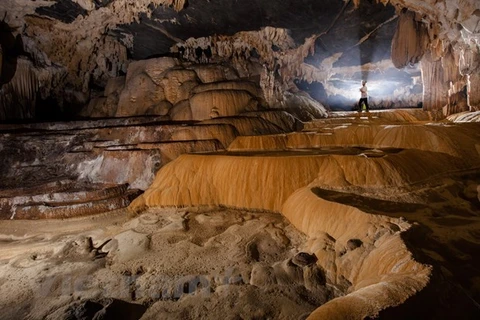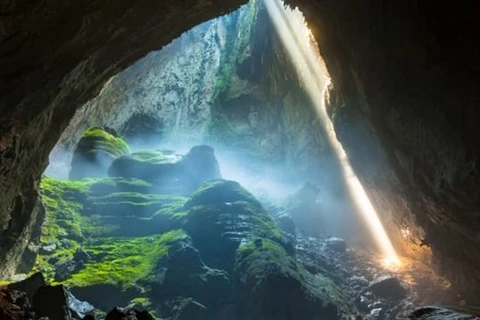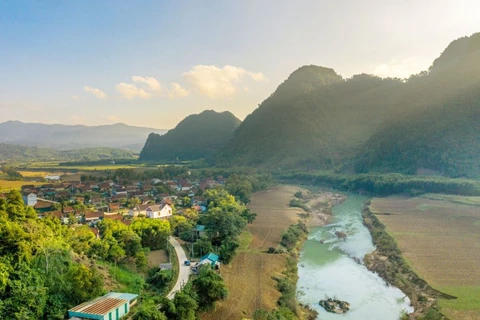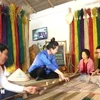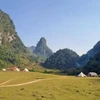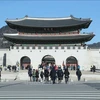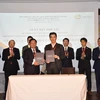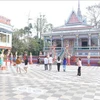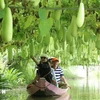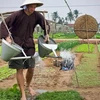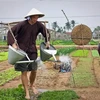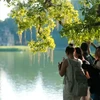Quang Binh (VNA) – Tan Hoa commune in Minh Hoa district, the central province of Quang Binh, battered by a cocktail of natural disasters every year, has risen from immense hardships to become an excellent tourism village. Most recently, it has been named among the Best Tourism Villages 2023 by the World Tourism Organsiation (UNWTO).
From flood-hit village…
Surrounded by spectacular limestone karst mountains and the Rao Nan river which resembles a jade silk ribbon snaking through peaks, Tan Hoa offers a peaceful heaven. From Quy Dat town, it’s about 8km to Tan Hoa which offers scenic beauty.
However, its unique terrain also puts Tan Hoa at risks when flooding season comes from mid-September to mid-November every year. The historic flooding in 2010 with water rising to 12 metres inundated local houses, and forced people to evacuate to nearby karst mountains. Properties swept away and poultry and crops damaged, local residents returned home empty-handed, and tried to rebuild their lives from almost zero.
To live safely along with floods, Tan Hoa villagers created floating houses of about 20 sq. m from wood with empty barrels underneath and poles to hold the houses in place.
During 2012-2020, Oxalis Adventure tour operator, through the “Tu Lan Race” event, called for financial support to build nearly 200 floating houses for poor families. The houses were constructed with stainless steel frame, walls and roof covered with corrugated iron sheets, and large enough for a family of at least six people and necessities to survive during monsoon season.
As of October 2023, more than 620 floating houses had been built for Tan Hoa locals with financial support from domestic individuals and organisations.
…To world’s tourism village
Now, floating houses are not only a place for Tan Hoa locals to live in but also a way for them to earn a living.
With support from Oxalis, 10 Tan Hoa households transformed their floating houses into climate-adaptive lodging facilities. Costing some 150 million VND (6,100 USD), each homestay offers 26-40 square metres of space for 1-3 people, with a private bathroom.
Truong Xuan Hung, owner of Hung Lien homestay, said his life has changed completely since opening his homestay to visitors.
“Our incomes are more stable now, therefore, our kids have better conditions to grow.”
Earlier, most of the residents earned their meager livings through agriculture and poultry but robust tourism activities have breathed a fresh air into their lives. Around 120 locals are now working as chefs, safety supervisors, and porters to serve tourists who join tours to discover Tu Lan cave. The jobs secure them 6-8 million VND a month.
According to Nguyen Chau A, Oxalis General Director, the construction of floating houses helps locals adapt to weather conditions while encouraging them to join efforts to develop local tourism.
A sustainable community-based tourism has been gradually formed, creating new experience for visitors, he said.
Many fascinating tourism products have been offered in the locality, including homestay, agri-tourism and culinary experience in residents' households.
The UNWTO’s recognition has affirmed the local authorities’ resolve to develop Tan Hoa into an excellent weather-adaptive tourism model in Vietnam and the Southeast Asia at large.
This is a global initiative to highlight villages and tourism sites’ efforts to preserve and promote community-based values, making contributions to realising sustainable development goals through tourism.
Tan Hoa is the only from Vietnam among the 260 applicants from 60 countries seeking the UNWTO’s title. Winning the title is the initial step for tourism development in Tan Hoa, and a chance for this locality to gradually become a bright spot of Vietnam’s tourism.
The Vietnam National Authority of Tourism under the Ministry of Culture, Sports and Tourism said Tan Hoa's recognition comes from its diverse and outstanding cultural and natural resources, as well as its commitments and actions to comply with the sustainable tourism principles.
Launched in 2021, the Best Tourism Villages by UNWTO initiative is part of the UNWTO Tourism for Rural Development Programme which works to foster development and inclusion in rural areas, combat depopulation, advance innovation and value chain integration through tourism, and encourage sustainable practices.
The localities are evaluated under nine key areas, namely cultural and natural resources; promotion and conservation of cultural resources; economic sustainability; social sustainability; environmental sustainability; tourism development and value chain integration; governance and prioritisation of tourism; infrastructure and connectivity; and health, safety, and security./.
From flood-hit village…
Surrounded by spectacular limestone karst mountains and the Rao Nan river which resembles a jade silk ribbon snaking through peaks, Tan Hoa offers a peaceful heaven. From Quy Dat town, it’s about 8km to Tan Hoa which offers scenic beauty.
However, its unique terrain also puts Tan Hoa at risks when flooding season comes from mid-September to mid-November every year. The historic flooding in 2010 with water rising to 12 metres inundated local houses, and forced people to evacuate to nearby karst mountains. Properties swept away and poultry and crops damaged, local residents returned home empty-handed, and tried to rebuild their lives from almost zero.
To live safely along with floods, Tan Hoa villagers created floating houses of about 20 sq. m from wood with empty barrels underneath and poles to hold the houses in place.
During 2012-2020, Oxalis Adventure tour operator, through the “Tu Lan Race” event, called for financial support to build nearly 200 floating houses for poor families. The houses were constructed with stainless steel frame, walls and roof covered with corrugated iron sheets, and large enough for a family of at least six people and necessities to survive during monsoon season.
As of October 2023, more than 620 floating houses had been built for Tan Hoa locals with financial support from domestic individuals and organisations.
…To world’s tourism village
Now, floating houses are not only a place for Tan Hoa locals to live in but also a way for them to earn a living.
With support from Oxalis, 10 Tan Hoa households transformed their floating houses into climate-adaptive lodging facilities. Costing some 150 million VND (6,100 USD), each homestay offers 26-40 square metres of space for 1-3 people, with a private bathroom.
Truong Xuan Hung, owner of Hung Lien homestay, said his life has changed completely since opening his homestay to visitors.
“Our incomes are more stable now, therefore, our kids have better conditions to grow.”
Earlier, most of the residents earned their meager livings through agriculture and poultry but robust tourism activities have breathed a fresh air into their lives. Around 120 locals are now working as chefs, safety supervisors, and porters to serve tourists who join tours to discover Tu Lan cave. The jobs secure them 6-8 million VND a month.
According to Nguyen Chau A, Oxalis General Director, the construction of floating houses helps locals adapt to weather conditions while encouraging them to join efforts to develop local tourism.
A sustainable community-based tourism has been gradually formed, creating new experience for visitors, he said.
Many fascinating tourism products have been offered in the locality, including homestay, agri-tourism and culinary experience in residents' households.
The UNWTO’s recognition has affirmed the local authorities’ resolve to develop Tan Hoa into an excellent weather-adaptive tourism model in Vietnam and the Southeast Asia at large.
This is a global initiative to highlight villages and tourism sites’ efforts to preserve and promote community-based values, making contributions to realising sustainable development goals through tourism.
Tan Hoa is the only from Vietnam among the 260 applicants from 60 countries seeking the UNWTO’s title. Winning the title is the initial step for tourism development in Tan Hoa, and a chance for this locality to gradually become a bright spot of Vietnam’s tourism.
The Vietnam National Authority of Tourism under the Ministry of Culture, Sports and Tourism said Tan Hoa's recognition comes from its diverse and outstanding cultural and natural resources, as well as its commitments and actions to comply with the sustainable tourism principles.
Launched in 2021, the Best Tourism Villages by UNWTO initiative is part of the UNWTO Tourism for Rural Development Programme which works to foster development and inclusion in rural areas, combat depopulation, advance innovation and value chain integration through tourism, and encourage sustainable practices.
The localities are evaluated under nine key areas, namely cultural and natural resources; promotion and conservation of cultural resources; economic sustainability; social sustainability; environmental sustainability; tourism development and value chain integration; governance and prioritisation of tourism; infrastructure and connectivity; and health, safety, and security./.
VNA


